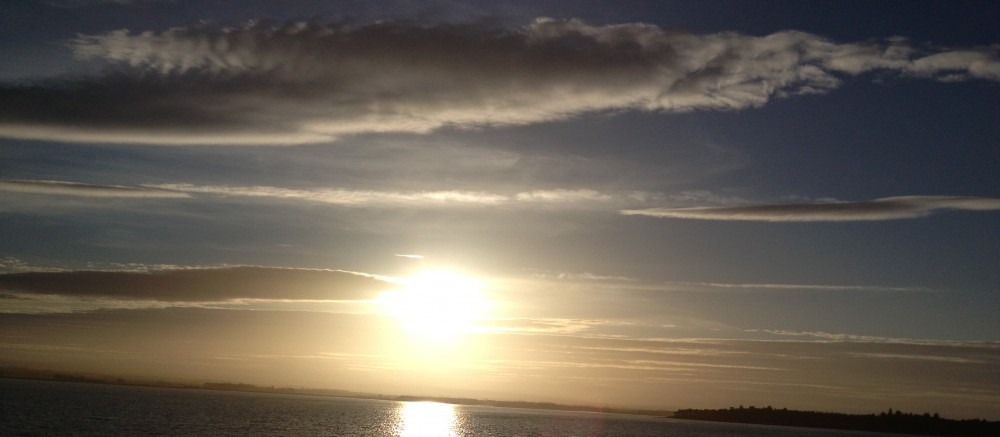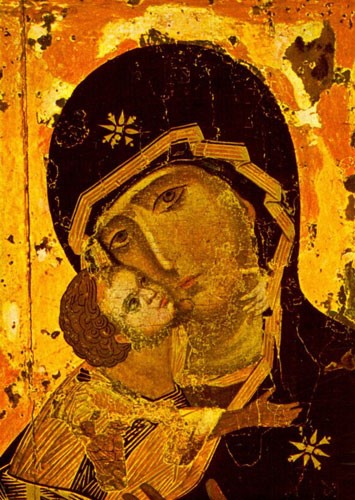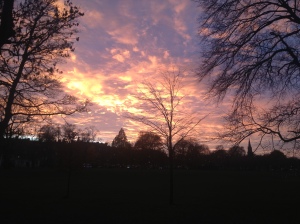Ever since the weather people decided to give our storms a name we have been rattling through the alphabet. If the weather goes on as it is just now, we’ll be back to “A” before we know it!
As an avid weather watcher, I should be better at wearing the right clothes when I go out, but my family are constantly amazed at how frequently I see a patch of blue sky, head out without a jacket and get drenched within a few minutes.
What I like to do is look at the pressure charts, (which sadly we don’t get so often on the TV these days). When a storm is looming you often notice that in the eye, all is perfectly calm. Sometimes the more intense the isobars, the quieter, more windless the centre can be.
I have placed a crib scene on the communion table for us to look at and reflect upon during this sermon. For me it is akin to the eye of a great storm. All is quiet, peaceful and calm. We sing about it in numerous carols, “Still the Night”, “Away in a manger, no crying he makes”. As someone once put it, “even the silence keeps silence”. Rude, rustic shepherds, disarmed by the stillness and wonder of the scene stand in awkward reverence. Wise men, drawn from afar, stand in solidarity alongside these rural peasants in equal awe, knowing that they have met in this child a king who exceeds whatever their own exalted status might have been. And, quietly, Mary takes it all in, pondering these things in her heart.
I have to confess that there are times in the past when I have found the crib scene a bit anodyne – a bit too sugary, twee and sentimental for my taste. Not anymore.
The more I reflect on this scene, the more I think it is fitting to have this moment of calm at the epicentre of a great tempest. For that is what this birth unleashes – a raging hurricane of controversy, opposition, the turning of tables, the upsetting of expectations, the re-ordering of priorities and the re-imagining of the world. This birth is the centre of a great cataclysmic reversal and inversion and from this moment of the incarnation, the world is taken differently.
Beyond this scene of calm a storm is looming on the horizon that will rage down the centuries, its effects still blowing through the life of the world, unsettling, disturbing, up-rooting. This is the birth that changes and challenges everything.
From the very beginning, as the scene of the birth in a stable passes, there is unsettlement, signs of a storm raging very close by. The crafty Herod enquires of the wise men where the Christ child should be born, so that he too might go and worship – as if! We all know that Herod’s first act on hearing this news is the slaughter of the innocents.
Then, Simeon in the Temple holds the baby Jesus in his arms and proclaims that this child will be a sign that will be opposed, a cause of great turbulence in the world and that a sword would pierce his mother’s heart. As we go further into the storm, the great figure of John the Baptist recognises that Jesus is the greater prophet and he, the forerunner. He baptises Jesus in the waters of the river Jordan, thus inaugurating Jesus’s ministry, and a voice is heard like thunder in the sky.
Then there is the ministry, the preaching in the synagogue at Nazareth that is so shocking and turbulent that it almost ends in a stoning. There is the radical alternative vision of the Sermon on the Mount, an ethical code based, not on an eye for an eye, but a turning of the other cheek; the challenge not just to be a peace-keeper, but a peace-maker, with all the sacrifice and risk that entails.
Then the healings, the miracles that continue to baffle with their meaning. There are the denunciations, the misunderstandings and all the while the storm builds in intensity, the isobars get closer together and a great frontal system of opposition looms, like another gathering storm Annabel to Barnie. There is the expectation on the part of some of an armed insurrection (an intifada) against Roman occupation, but that is soon snuffed out by the one who says, “Put away your sword”. Then there is the arrest, the false accusation, the scourging, the crucifixion and the agonising death. The storm seems to have passed and all is calm once more, people return to their old ways, the fishermen to their boats and Mary continues to ponder these things in her heart as she sits in vigil at the foot of the cross. All is calm once more – but don’t be fooled.
What we discover is that we are at the epicentre of another storm, for now there are rumours that this death was like no other, that the message did not die with its champion but returns in the power of the spirit. And fairly soon another storm is raging as the disciples and followers of Jesus become the community of the resurrection, the people of the way, who trust that love cannot be overcome even by the grave.
And the storm is raging amongst us now! How will we spend our days? Will the Christ and his ways take hold of us and blow through us, transforming us from the patterns of this passing world until we discern the pattern that Christ is weaving in the life of the world. Or do we hope it will all pass us by if we avoid taking the risk of heading out until we are sure the storm has passed?
But there is no avoiding this storm. The storm is raging about us. We have to make decisions and choices. And I am constantly drawn back to this nativity scene. For it asks us a question that is very important. The question is this: Can a King rule from a crib? What I mean by that is that this scene of peace and calm, some might say harmless innocence and vulnerability is a scene that foreshadows the Kingdom Jesus announces. It is a scene of love, reconciliation, nurture, concern and unity. Rustic shepherds share the same space as wise men from the east. All stand in reverence to a mother and earthly father doing their level best to nurture and protect a child. Is this how it is meant to be? Is this scene of stillness at the eye of the storm a glimpse into what the Kingdom looks like and what we should all be working towards? Not a power struggle, not a battle for pre-eminence, not a war of ideologies or a clash of cultures vying for supremacy – just a gentle scene of peace- making, reconciliation, nurture and love.
And then look at the still centre of your own being, the deep place where, as the prophet says, God has written the law and inscribed the precepts by which we should live on our inward parts. Written into the very DNA of our being is this impulse towards community, towards caring and providing for the needs of others-we are programmed for love –programmed to strive towards the crib scene where all is peace and calm.
War, greed, ideological struggle, the exercise of rude power for gain go against the grain of our true selves. The willing warrior, the plunderer and looter of others’ riches, the arrogant inciter of hatred of the “other” are all sure signs of the person ill at ease with themselves, uncomfortable in their own skin.
One of the patriarchs of the church was John the Elder who is supposed to have written the following prayer:
You who are hidden and concealed in me, reveal within me your hidden mystery. Manifest to me your beauty that is within me.
O, you who has built me as a temple for you to dwell in, cause the cloud of you glory to overshadow inside your temple, so that the ministers of your sanctuary may cry out in love for you, “Holy!” as an utterance that burns in fire and spirit – a sharp stirring that is comingled with wonder and astonishment, activated as a living movement by the power of your being”.
Somewhere in ourselves is the eye of a storm, a deep still centre waiting to be stirred into a great outpouring of love and wonder and grace and all those qualities that might transform the world and foreshadow the kingdom, if only they were let loose and allowed to blow free in the world.
So, as we look in on the quiet calm of this crib scene and anticipate the storm to come in the life of the infant Jesus, may we look in on the still centre of our own being where the Divine nature dwells and go from here and blow with the wind of the spirit, at loose in the world transforming, challenging, refreshing and making all things new.,
The scripture warns about those who are luke-warm, those who do not rise to the challenge of peace making and the ministry of reconciliation. We are called as Christians to blow through the world and to burn with sacred fire, to create the ripples of a storm that is the Spirit of the risen Christ “filling the universe as the waters cover the sea”. This poem I found many years ago by someone called M. Farrow sums up very well the idea that in choosing the life of the spirit there must be consequences that are turbulent and transformative and I end with these words:
Give us faces of stone
To set against the drift,
To set against the swift, strong headlong
Current swollen to a torrent
That is sweeping our world away….
Give us hearts of flame
To burn against the cold,
To burn against the old, the mortal chill,
The quenching thrill
Of the fast-flooding tide.
Thou art Fire and Light
(Give us hearts of flame!)
Make us to burn like beacons
In defiance of ancient Night.
Make us braziers in the cold streets of the cities
Make us lamps in Thy sanctuaries,
Make us candles to the Sacred Heart.
The world is lost and looking for the way.







![Slide3[2]](https://richardfrazer.files.wordpress.com/2014/05/slide32.jpg?w=584)
